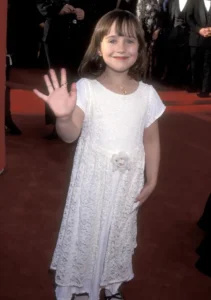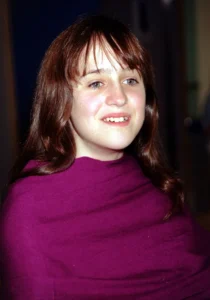“Matilda” star Mara Wilson surprised many people when she left Hollywood at a young age because of the tough beauty standards in the industry. She shared her personal struggles, which included body dysmorphia, obsessive-compulsive disorder, and the loss of her mother. Let’s see what Wilson is doing now and how her views have changed since she stepped away from the spotlight.
Many fans of fantasy-comedy films remember Mara Wilson as the charming young actress who captured hearts in movies like “Matilda” and “Mrs. Doubtfire.” She had great success on screen at an early age, but she made a surprising choice to leave Hollywood when she was still young.
Wilson faced difficulties with the strict beauty standards in the industry, which pushed her to step back from acting and live a more private life. Here’s what happened to the talented actress after she left the public eye.

Mara Wilson’s career started when she was only five years old. She was inspired by her oldest brother, Daniel Ben Wilson, who had begun acting in television commercials. Wanting to follow in his footsteps, young Wilson was eager to try acting herself.

At first, Mara’s parents were unsure and didn’t want her to pursue acting. However, her determination convinced them, and they eventually agreed to let her try it out.
Not long after, Wilson started appearing in various commercials, including ones for Texaco and Bank of America, which marked the start of her journey in show business.

Like her mother, Wilson faced struggles in her life, especially as a child star. She shared that even though she was popular, she often felt very lonely.
When she hit puberty, she no longer wanted to be famous and sometimes wished she could just escape from all the attention and publicity.

The actress often faced harsh comments about her appearance, including her weight and looks, which she found upsetting. Wilson recalled that people would call her “ugly” and say she was “useless now” and that she wasn’t cute anymore. She mentioned, “They said cruel and sexualized things about my body too.”

At 29, Mara Wilson felt sad when people seemed disappointed that she didn’t look the way they expected her to. She felt rejected, even though she was exhausted from acting and Hollywood had moved on without her. This experience led to a long struggle with body dysmorphia and an unhealthy obsession with her appearance.
She explained, “You think, ‘I’m ugly, I’m fat’ – and there were actual websites and newspapers and movie reviewers saying that about me.” This negativity affected her deeply, making it hard for her to see herself in a positive light.

Mara Wilson later attended New York University, where she wrote about her mother’s death for the first time. While working as a barista and a nanny, she often feared being recognized and ending up in a “where-are-they-now?” article.
She thought about taking a job in Los Angeles but decided against it, worrying that people would recognize her. Wilson wanted to move past being seen as someone to pity, but she still wondered if others would feel sorry for her because of her past.
Saleslady Kicks Poor Old Woman Out of Luxury Store, Cop Brings Her Back Later

This story is a touching example of how kindness, empathy, and resilience can transform an ordinary moment into something life-changing. Kerry’s dedication to her granddaughter, Anne, shines through as she goes to great lengths to make Anne’s prom special, despite her limited means. The story takes an unexpected turn when George, a compassionate young apprentice officer, steps in, demonstrating that there are always people willing to help and stand up for what’s right.
The twist at the end, with George becoming Anne’s date and later her husband, is heartwarming and poetic. It reinforces Kerry’s belief that sometimes, all it takes is a single moment—like prom night—to change the course of someone’s life. Their eventual marriage symbolizes the unexpected rewards of standing up for loved ones and never letting unjust situations go unchallenged.
Kerry’s bravery in the face of adversity, George’s genuine kindness, and Anne’s eventual joy highlight how genuine connections and empathy can lead to beautiful outcomes, even in the face of prejudice. This tale reminds us that family, love, and small acts of bravery can pave the way for life’s most meaningful moments.



Leave a Reply